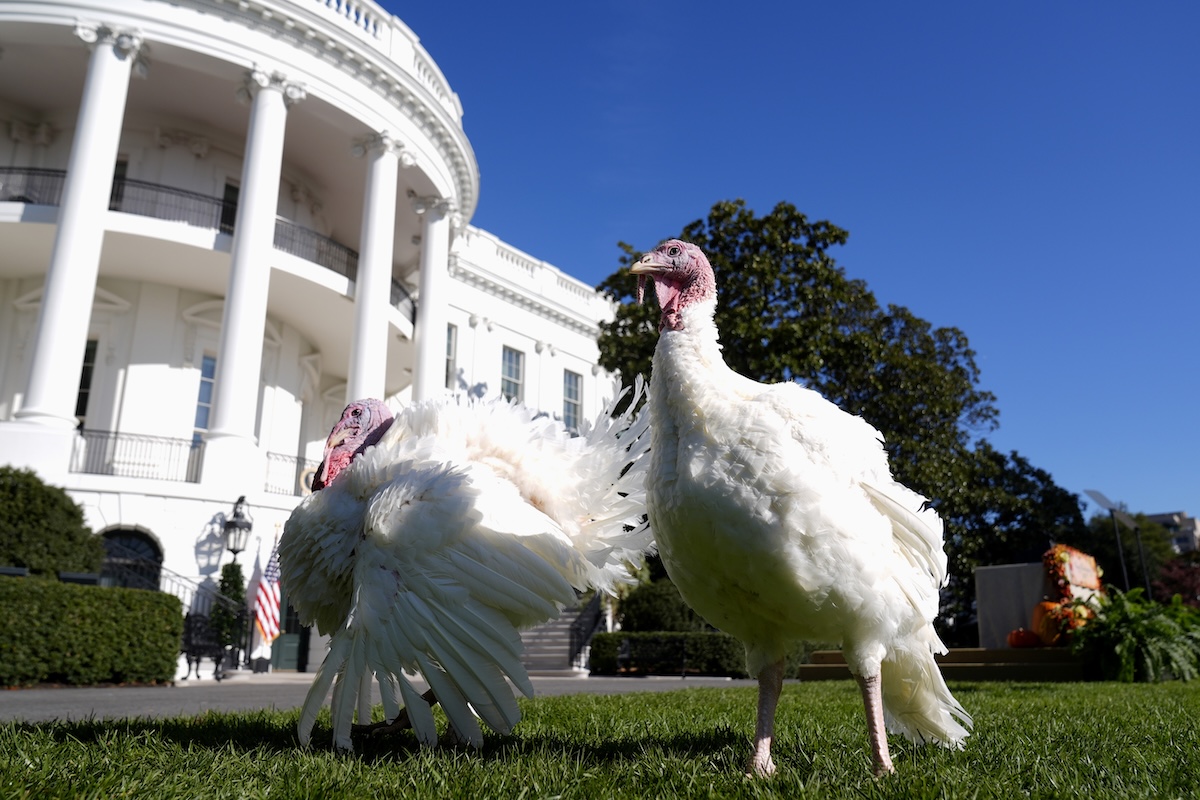Stand up for the facts!
Our only agenda is to publish the truth so you can be an informed participant in democracy.
We need your help.
I would like to contribute

An illustration shows a family arguing over politics at the holiday dinner table. (AP)
If Your Time is short
-
Civil discourse refers broadly to discussions in which people genuinely try to understand one another, experts said.
-
Some expert tips for engaging in civil discourse include setting clear expectations for the conversation, listening actively, being curious and avoiding assumptions about someone else’s beliefs.
-
If the conversation turns emotional or unproductive, experts said it’s OK to take a break or stop engaging entirely.
After the contentious 2024 election, Thanksgiving could involve both gobbling up delicious food and perhaps squabbling over politics with family and friends.
An August Gallup poll found that a record-high 80% of U.S. adults believe Americans are "greatly divided on most important values." The definition of "most important values" was left to respondents’ interpretation, Gallup said.
This division can be stressful. An August survey from the American Psychological Association found that U.S. adults’ top stressors were related to politics.
But PolitiFact is here to help prevent clashes with loved ones this holiday season. We spoke with experts on civil discourse — discussions in which people genuinely try to understand one another — about what to do when political topics come up and how to engage in more productive conversations.
What is civil discourse?
Civil discourse is about listening to and acknowledging someone else’s point of view. The goal is to talk, not to agree, experts said.
Cassandra Dahnke, co-founder of the Institute for Civility, a nonpartisan nonprofit, said her organization defines civility as "claiming and caring for one’s identity, needs and beliefs without degrading someone else’s in the process."
Some people might interpret civility as politeness, but in academic circles, that’s typically regarded as "weak civility," said Jennifer Lambe, a University of Delaware associate communication professor who specializes in free speech and civil discourse.
"Strong civility, on the other hand, is characterized by the recognition and respect of differences, by open dialogue with the goal to understand each other (not necessarily to persuade), and by active listening," Lambe said.
Kathryn Joyce, director of the Civil Discourse for Citizenship program at Ohio State University’s Center for Ethics and Human Values, advised people to think about civil discourse as an opportunity to explore a particular topic with others.
"Like a debate is about persuasion or winning, civil discourse, by contrast, is about learning and moving toward mutual understanding," Joyce said.

The national Thanksgiving turkeys Peach and Blossom are pictured before a pardoning ceremony with President Joe Biden on the South Lawn of the White House in Washington, Nov. 25, 2024. (AP)
How to have more civil conversations about politics
Experts said the first thing to do when politics or other difficult topics arise in conversation is decide whether to engage.
If emotions are running high or people aren’t approaching the conversation with an open mind, it’s not the right environment for civil discourse, Joyce said.
"You have to sort of manage your emotions to engage in civil discourse well," Joyce said. "We’re never going to be emotionless when we talk about things that really matter to us, but it’s about being in a place where you can be curious and charitable."
Ohio State’s civil discourse program uses "the 4C’s" as a guide: "be curious, be charitable, be conscientious and be constructive."
If everyone involved has the right mindset for civil discourse, experts offer these tips for a productive conversation.
Set clear intentions. The goal is up to the people in the conversation. For example, they could want to learn more about another person’s perspective. But the aim shouldn’t be to persuade another person to agree.
"Disagreements are a part of life," Dahnke said. "We can either choose to create chaos and problems through those differences … or you can use it as an opportunity for growth and insight and creative solutions."
Engage in active listening to understand the other person’s point of view.
Often when people start talking about politics, they’re "talking past each other," Joyce said.
"They’re really just listening, waiting for their turn to talk, so that they can rebut some points," Joyce said. "And that doesn't get us very far."
To show people you are listening, try repeating their views back to them in your own words until you’ve got it right, Joyce said.
"People are pretty willing, once they feel heard and understood, to really listen to you and show you the same sort of courtesy," Joyce said.
Be curious. Ask questions to learn more about why someone holds certain beliefs or views.
Marissa Fond, a Georgetown University sociolinguist and assistant teaching professor, said some phrases people can use are, "How did you come to that opinion?" or "Tell me more."
"In particularly heated situations, sometimes we think that if we show curiosity for someone else’s point of view … that we are giving voice to thoughts or values that we find repugnant," Fond said. "But you don’t have to agree with someone to be curious."
Avoid making assumptions. It’s easy to make snap judgments upon hearing another person’s opinions, but it’s important to keep an open mind.
Asking questions and being receptive to what the other person says "can help somebody feel like you haven’t made up your mind already or haven’t prejudged them," Fond said.
It’s OK to walk away
Civil discourse is "no easy task," Dahnke said. It takes commitment and practice, and everyone involved needs to want it, she said.
"What people run into at holiday meals is not everybody’s buying into the same ground rules," Dahnke said. "If you run into that situation where you have someone in the family who’s just gonna bring it to the table, whether everybody wants it or not, I would just not respond."
Dahnke said other options include offering to talk about politics later or trying to shift the conversation to something more neutral.
"You cannot control another person’s behavior, but you can control your own," Dahnke said.
Even if at the start everyone has good intentions and agrees to a civil discussion, the conversation can veer off track and leave people feeling argumentative, defensive or upset.
When this happens, Lambe recommended calling it out by saying something like, "I can feel the tension rising between us." She advised taking a break and returning when everyone is calmer.
Joyce said it’s just as important to consider other people’s emotions as it is to "monitor yourself."
Sometimes, after taking a break, people won’t want to continue the conversation, and that’s OK, too, Joyce said.
However a conversation goes, Joyce said, people should focus on "finding what you’ve accomplished in a conversation other than agreement." For example, this can be better understanding one another’s views, she said.
"Once you start talking to people, they can really surprise you," Joyce said. "They are less extreme than the politicians they support a lot of the time, and so, I think that we really do have to do our best to get out of the mindset that ‘you’re with me, or you’re against me.’"
Our Sources
Phone interview with Kathryn Joyce, director of the Center for Ethics and Human Values’ Civil Discourse for Citizenship program at Ohio State University, who specializes in social and political philosophy, Nov. 25, 2024
Phone interview with Cassandra Dahnke, co-founder of the Institute for Civility, Nov. 25, 2024
Phone interview with Marissa Fond, a sociolinguist and assistant teaching professor at Georgetown University, Nov. 25, 2024
Email interview with Jennifer Lambe, associate professor of communication and an affiliated faculty member with the Stavros Niarchos Foundation's Ithaca Initiative on Civil Discourse in the Biden School of Public Policy and Administration at the University of Delaware, Nov. 25, 2024
Gallup, "Americans Agree Nation Is Divided on Key Values," Sept. 23, 2024
American Psychological Association, "Stress in America 2024: A nation in political turmoil," October 2024
Ohio State University’s Center for Ethics and Human Values, "The 4Cs: Virtues of Civil Discourse," accessed Nov. 26, 2024
Institute for Civility, "What is Civility?," accessed Nov. 26, 2024




























